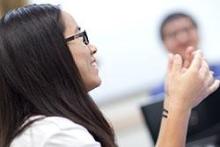The pre-clerkship clinical curriculum runs longitudinally through the Foundations of Medicine and Health and seeks to develop a broad range of clinical and professional capabilities. Foundations of Clinical Medicine develops the necessary skill sets through the following separate, but integrated programs that take place across Year 1 and 2:
Tuesday Seminars
This program continues the theme of “doctoring” begun in Block 1 through the Year 1 and Year 2 curriculum. Topics examined include the relationship between the physician and the patient, the family and the community; professionalism; healthcare disparities; cultural competence; quality improvement; law and medicine; medical error/patient safety; development of mindful practitioners and end of life issues.
Communications in Medicine
This program comprises various workshops that focus on the range of skills needed for effectively talking with patients including the basic medical interview, educating patients about a disease, counseling patients for health behavior change, and presenting difficult news and diagnosis.
Physical Diagnosis
Physical Diagnosis 1 introduces the basic adult exam to Year 1 students, with one session per week for eight weeks. Physical Diagnosis 2 provides in-depth regional exams in various formats during Year 1 and Year 2.
Clinical Reasoning
This is a thread throughout Foundations of Clinical Medicine that teaches students how to develop a complete and appropriately focused differential diagnosis. This begins in IQ, continues in Physical Diagnosis 2 Clinical Reasoning sessions and culminates in the Clinical Skills Exams.
Patient-based Programs
Outpatient clinical sessions during either Year 1 or Year 2 in which students spend some afternoons in a community physician's office developing and reinforcing medical interviewing, physical exam and presentation skills (written and oral) with ongoing mentorship from a preceptor. Students additionally have skills practice sessions to help practice the skill of synthesizing information, mimicking outpatient clinical encounters. Finally, students spend three sessions doing complete histories, physicals and write-ups on patients they see in an in-patient setting.
Procedures
Training in basic medical and surgical procedures, including infection control (PPE donning and doffing, and handwashing), hemorrhage control, scene safety, basic airway management, anaphylaxis and overdose management, sterile field, gloving and gowning, OR scrub, suturing, injections, phlebotomy, and IV placement.


